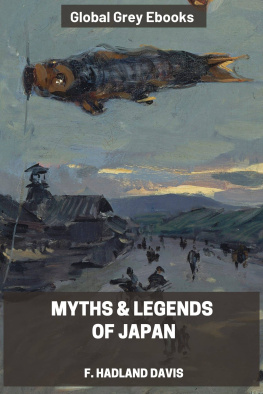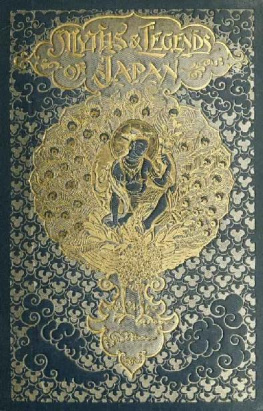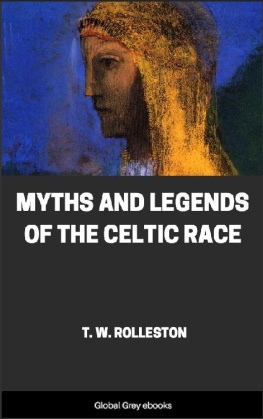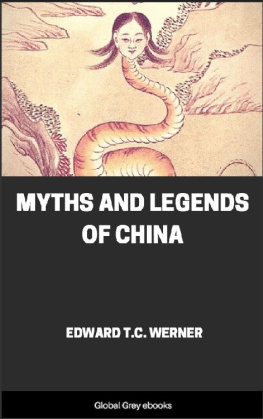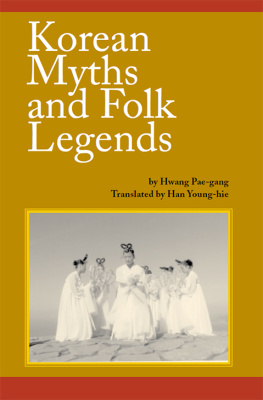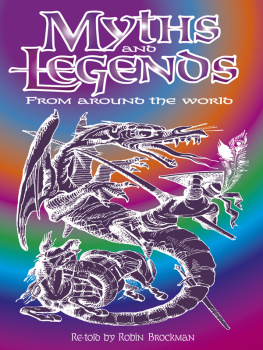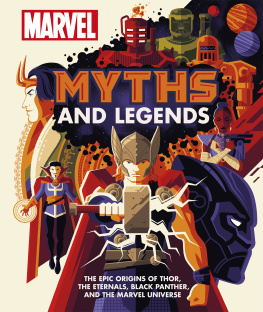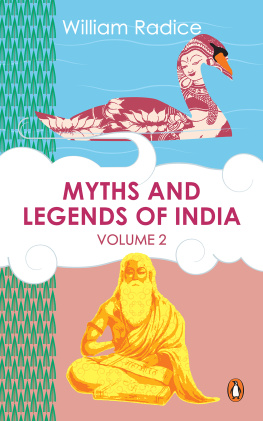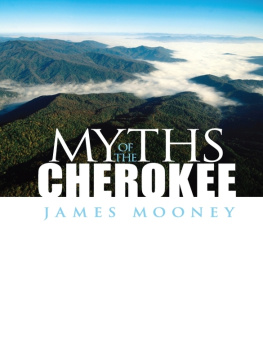F. Hadland Davis - Myths & Legends of Japan
Here you can read online F. Hadland Davis - Myths & Legends of Japan full text of the book (entire story) in english for free. Download pdf and epub, get meaning, cover and reviews about this ebook. year: 2021, publisher: Global Grey, genre: Non-fiction. Description of the work, (preface) as well as reviews are available. Best literature library LitArk.com created for fans of good reading and offers a wide selection of genres:
Romance novel
Science fiction
Adventure
Detective
Science
History
Home and family
Prose
Art
Politics
Computer
Non-fiction
Religion
Business
Children
Humor
Choose a favorite category and find really read worthwhile books. Enjoy immersion in the world of imagination, feel the emotions of the characters or learn something new for yourself, make an fascinating discovery.
- Book:Myths & Legends of Japan
- Author:
- Publisher:Global Grey
- Genre:
- Year:2021
- Rating:4 / 5
- Favourites:Add to favourites
- Your mark:
- 80
- 1
- 2
- 3
- 4
- 5
Myths & Legends of Japan: summary, description and annotation
We offer to read an annotation, description, summary or preface (depends on what the author of the book "Myths & Legends of Japan" wrote himself). If you haven't found the necessary information about the book — write in the comments, we will try to find it.
Myths & Legends of Japan — read online for free the complete book (whole text) full work
Below is the text of the book, divided by pages. System saving the place of the last page read, allows you to conveniently read the book "Myths & Legends of Japan" online for free, without having to search again every time where you left off. Put a bookmark, and you can go to the page where you finished reading at any time.
Font size:
Interval:
Bookmark:

Myths and Legends of Japan
by F. Hadland Davis
First published in 1912
This ebook edition was created and published by Global Grey
The artwork for the cover is Carp Banners in Kyoto
painted by Louis Dumoulin.
You can download this book on the site:
globalgreyebooks.com/myths-and-legends-of-japan-ebook.html

GlobalGrey 2021
globalgreyebooks.com
In writing Myths and Legends of Japan I have been much indebted to numerous authorities on Japanese subjects, and most especially to Lafcadio Hearn, who first revealed to me the Land of the Gods. It is impossible to enumerate all the writers who have assisted me in preparing this volume. I have borrowed from their work as persistently as Japan has borrowed from other countries, and I sincerely hope that, like Japan herself, I have made good use of the material I have obtained from so many sources.
I am indebted to Professor Basil Hall Chamberlain for placing his work at my disposal, and I have found his encyclopdic volume, Things Japanese, his translation of the Kojiki, his Murray's Hand-book for Japan (in collaboration with W. B. Mason), and his Japanese Poetry, of great value. I thank the Executors of the late Dr. W. G. Aston for permission to quote from this learned authority's work. I have made use of his translation of the Nihongi (Transactions of the Japan Society, 1896) and have gathered much useful material from A History of Japanese Literature. I am indebted to Mr. F. Victor Dickins for allowing me to make use of his translation of the Taketori Monogatari and the Ho-j-ki. My friend Mrs. C. M. Salwey has taken a sympathetic interest in my work, which has been invaluable to me. Her book, Fans of Japan, has supplied me with an exquisite legend, and many of her articles have yielded a rich harvest. I warmly thank Mr. Yone Noguchi for allowing me to quote from his poetry, and also Miss Clara A. Walsh for so kindly putting at my disposal her fascinating volume, The Master-Singers of Japan, published by Mr. John Murray in the "Wisdom of the East" series. My thanks are due to Messrs. Houghton, Mifflin Company, for allowing me to quote from Lafcadio Hearn's Glimpses of Unfamiliar Japan and The Japanese Letters of Lafcadio Hearn; to Messrs. George Allen & Sons, for giving me permission to quote from Sir F. T. Piggott's Garden of Japan; to the Editor of the Academy, for permitting me to reprint my article on "Japanese Poetry," and to Messrs. Cassell and Co. Ltd., for allowing me to reproduce "The Garden of Japan," which I originally contributed to Cassell's Magazine. The works of Dr. William Anderson, Sir Ernest Satow, Lord Redesdale, Madame Ozaki, Mr. R. Gordon Smith, Captain F. Brinkley, the late Rev. Arthur Lloyd, Mr. Henri L. Joly, Mr. K. Okakura, the Rev. W. E. Griffis, and others, have been of immense value to me, and in addition I very warmly thank all those writers I have left unnamed, through want of space, whose works have assisted me in the preparation of this volume.
Pierre Loti in Madame Chrysanthme, Gilbert and Sullivan in The Mikado, and Sir Edwin Arnold in Seas and Lands, gave us the impression that Japan was a real fairyland in the Far East. We were delighted with the prettiness and quaintness of that country, and still more with the prettiness and quaintness of the Japanese people. We laughed at their topsy-turvy ways, regarded the Japanese woman, in her rich-coloured kimono, as altogether charming and fascinating, and had a vague notion that the principal features of Nippon were the tea-houses, cherry-blossom, and geisha. Twenty years ago we did not take Japan very seriously. We still listen to the melodious music of The Mikado, but now we no longer regard Japan as a sort of glorified willow-pattern plate. The Land of the Rising Sun has become the Land of the Risen Sun, for we have learnt that her quaintness and prettiness, her fairy-like manners and customs, were but the outer signs of a great and progressive nation. To-day we recognise Japan as a power in the East, and her victory over the Russian has made her army and navy famous throughout the world.
The Japanese have always been an imitative nation, quick to absorb and utilise the religion, art, and social life of China, and, having set their own national seal upon what they have borrowed from the Celestial Kingdom, to look elsewhere for material that should strengthen and advance their position. This imitative quality is one of Japan's most marked characteristics. She has ever been loath to impart information to others, but ready at all times to gain access to any form of knowledge likely to make for her advancement. In the fourteenth century Kenk wrote in his Tsure-dzure-gusa: "Nothing opens one's eyes so much as travel, no matter where," and the twentieth-century Japanese has put this excellent advice into practice. He has travelled far and wide, and has made good use of his varied observations. Japan's power of imitation amounts to genius. East and West have contributed to her greatness, and it is a matter of surprise to many of us that a country so long isolated and for so many years bound by feudalism should, within a comparatively short space of time, master our Western system of warfare, as well as many of our ethical and social ideas, and become a great world-power. But Japan's success has not been due entirely to clever imitation, neither has her place among the foremost nations been accomplished with such meteor-like rapidity as some would have us suppose.
We hear a good deal about the New Japan to-day, and are too prone to forget the significance of the Old upon which the present rgime has been founded. Japan learnt from England, Germany and America all the tactics of modern warfare. She established an efficient army and navy on Western lines; but it must be remembered that Japan's great heroes of to-day, Togo and Oyama, still have in their veins something of the old samurai spirit, still reflect through their modernity something of the meaning of Bushido. The Japanese character is still Japanese and not Western. Her greatness is to be found in her patriotism, in her loyalty and whole-hearted love of her country. Shintism has taught her to revere the mighty dead; Buddhism, besides adding to her religious ideals, has contributed to her literature and art, and Christianity has had its effect in introducing all manner of beneficent social reforms.
There are many conflicting theories in regard to the racial origin of the Japanese people, and we have no definite knowledge on the subject. The first inhabitants of Japan were probably the Ainu, an Aryan people who possibly came from North-Eastern Asia at a time when the distance separating the Islands from the mainland was not so great as it is to-day. The Ainu were followed by two distinct Mongol invasions, and these invaders had no difficulty in subduing their predecessors; but in course of time the Mongols were driven northward by Malays from the Philippines. "By the year A.D. 500 the Ainu, the Mongol, and the Malay elements in the population had become one nation by much the same process as took place in England after the Norman Conquest. To the national characteristics it may be inferred that the Ainu contributed the power of resistance, the Mongol the intellectual qualities, and the Malay that handiness and adaptability which are the heritage of sailor-men." Such authorities as Baelz and Rein are of the opinion that the Japanese are Mongols, and although they have intermarried with the Ainu, "the two nations," writes Professor B. H. Chamberlain, "are as distinct as the whites and reds in North America." In spite of the fact that the Ainu is looked down upon in Japan, and regarded as a hairy aboriginal of interest to the anthropologist and the showman, a poor despised creature, who worships the bear as the emblem of strength and fierceness, he has, nevertheless, left his mark upon Japan. Fuji was possibly a corruption of Huchi, or Fuchi, the Ainu Goddess of Fire, and there is no doubt that these aborigines originated a vast number of geographical names, particularly in the north of the main island, that are recognisable to this day. We can also trace Ainu influence in regard to certain Japanese superstitions, such as the belief in the
Next pageFont size:
Interval:
Bookmark:
Similar books «Myths & Legends of Japan»
Look at similar books to Myths & Legends of Japan. We have selected literature similar in name and meaning in the hope of providing readers with more options to find new, interesting, not yet read works.
Discussion, reviews of the book Myths & Legends of Japan and just readers' own opinions. Leave your comments, write what you think about the work, its meaning or the main characters. Specify what exactly you liked and what you didn't like, and why you think so.

